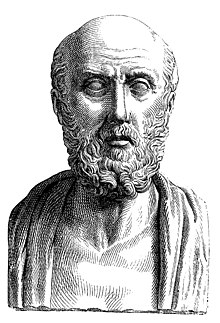Hippocratic Oath
Appearance


The Hippocratic Oath is an oath of ethics historically taken by physicians. It is one of the most widely known of Greek medical texts. In its original form, it requires a new physician to swear, by a number of healing gods, to uphold specific ethical standards. The oath is the earliest expression of medical ethics in the Western world, establishing several principles of medical ethics which remain of paramount significance today. These include the principles of medical confidentiality and non-maleficence. The original oath was written between the fifth and third centuries BC, is traditionally attributed to the Greek doctor Hippocrates, while modern scholars do not regard it as having been written by Hippocrates himself.
Quotes
[edit]Hippocratic Oath: Classical Version
[edit]- I swear by... all the gods and goddesses, making them my witnesses, that I will fulfill according to my ability and judgment this oath...:
- To hold him who has taught me this art as equal to my parents and to live my life in partnership with him...
- To regard his offspring as equal to my brothers.. and to teach them this art — if they desire to learn it — without fee and covenant...
- I will apply dietetic measures for the benefit of the sick according to my ability and judgment; I will keep them from harm and injustice.
- I will neither give a deadly drug to anybody who asked for it, nor will I make a suggestion to this effect.
- I will not give to a woman an abortive remedy. In purity and holiness I will guard my life and my art.
- Whatever houses I may visit, I will come for the benefit of the sick, remaining free of all intentional injustice, of all mischief and in particular of sexual relations with both female and male persons, be they free or slaves.
- What I may see or hear...in regard to the life of men...I will keep to myself, holding such things shameful to be spoken about.
- If I fulfill this oath and do not violate it, may it be granted to me to enjoy life and art, being honored with fame among all men...
- if I transgress it and swear falsely, may the opposite of all this be my lot.
- The Hippocratic Oath: Text, Translation, and Interpretation, by Ludwig Edelstein (translation from the Greek). (1943)
Hippocratic Oath, Modern Version
[edit]- I swear to fulfill, to the best of my ability and judgment, this covenant:
- I will respect the hard-won scientific gains of those physicians in whose steps I walk, and gladly share such knowledge as is mine with those who are to follow.
- I will apply, for the benefit of the sick, all measures [that] are required, avoiding those twin traps of overtreatment and therapeutic nihilism.
- I will remember that there is art to medicine as well as science, and that warmth, sympathy, and understanding may outweigh the surgeon's knife or the chemist's drug.
- I will not be ashamed to say "I know not," nor will I fail to call in my colleagues when the skills of another are needed for a patient's recovery.
- I will respect the privacy of my patients
- If it is given me to save a life, all thanks. But it may also be within my power to take a life; this awesome responsibility must be faced with great humbleness and awareness of my own frailty. Above all, I must not play at God.
- I will remember that I do not treat a fever chart, a cancerous growth, but a sick human being...
- I will prevent disease whenever I can, for prevention is preferable to cure.
- I will remember that I remain a member of society, with special obligations to all my fellow human beings...
- If I do not violate this oath, may I enjoy life and art, respected while I live and remembered with affection thereafter. May I always act so as to preserve the finest traditions of my calling and may I long experience the joy of healing those who seek my help.
- Louis Lasagna [Oath, Modern Version], Academic Dean of the School of Medicine at Tufts University (1964)
See also
[edit]- Ethics
- Execution
- Health care
- Hippocrates
- Integrity
- Medicine
- Morality
- Physician
- Responsibility
- Virtues

